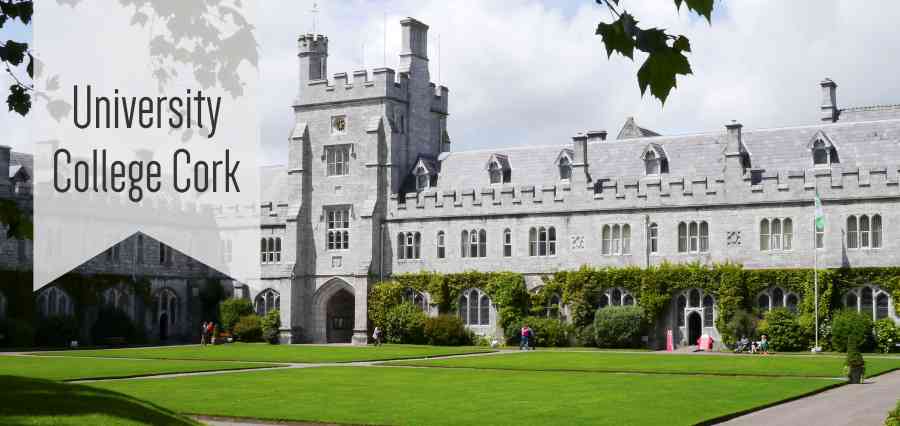UCC is competent in the delivery of flexible, leading-edge education, training and development, through interdisciplinary collaboration, by making STEM learning fun, interactive and educational to inspire the future scientists, technologists, engineers and mathematicians.
A STEM qualification provides a strong foundation to make an impact in people’s lives and environment through new devices, technologies, products, drugs and medicines, new processes and cleaner economies. University College Cork aims to light the student’s fire of curiosity and passion for exploring and learning about the amazing world by engaging them with STEM education from an early age.
The university was founded in 1845 as one of the three Queen’s Colleges located in Belfast, Cork, and Galway. It became University College, Cork, under the Irish Universities Act of 1908. It provides a full range of discipline, serving regional, national and international students. UCC attracts disproportionately high number of top school leavers compared to other universities. It offers programmes in the arts, humanities, social sciences, business, law, engineering, architecture, science, food science, medicine, dentistry, pharmacy, nursing and the clinical therapies.
The College of Science, Engineering & Food Science department is particularly proactive in targeting students at an early stage at both primary and secondary levels. As part of a research-led University, the department takes pride in embedding research into the curricula across their portfolio of programmes. Their degrees have a strong focus on the laboratory experience across all disciplines of STEM and most of the degree programmes incorporate formal placement as part of the curriculum.
University College Cork: One of the Oldest Universities “Imparting Innovation and Knowledge”
- UCC has 21,000 students. These comprise of 15,000 in undergraduate programmes, 4,400 in postgraduate study and research, and 2,800 adults in continuing education. Its student body includes 3,300 international students, representing more than 100 countries worldwide.
- University College Cork (UCC) is in the top 2% of universities worldwide. It is a research-intensive, student-centred, international top-tier university.
- In 2010, University College Cork was the first third level education institute worldwide to receive the Green Campus Award along with the Green Flag for environmental friendliness.
- UCC was voted as the Best University in Ireland by the Sunday Times, that too three times in the past decade. UCC is the only Irish University to have won this accolade.
- Several of Ireland’s top research centres are based in UCC, including Tyndall National Research Institute (microsystems, photonics, and nanotechnology) and the APC Microbiome Institute (alimentary health, functional foods), both recognized as global leaders.
- Academics and researchers in the College of Science, Engineering and Food Science have a strong track record of attracting prestigious research funding and are involved in international collaborations with colleagues throughout the world.
- A science degree in UCC not only provides a foundation in a specific discipline, it also provides graduates with key attributes and skills such as critical thinking, problem solving, creativity and innovation, and communication.
- UCC has over 80 active societies and 50 different sports clubs. There are academic, charitable, creative, gaming/role-playing, political, religious, and social societies and clubs incorporating field sports, martial arts, watersports as well as outdoor and indoor team and individual sports.
Sagacious Educators of the University College Cork
The year 2015 marked the bicentenary of the birth of UCC’s most notable ‘independent thinker’, George Boole (1815-1864). A year-long programme of events and activities celebrated the life and legacy of UCC’s first professor of mathematics and the forefather of the digital age, who is also famous for contributing Boolean Algebra.
Mary MacSwiney (1872-1942) was a noted republican, feminist, and educator. A charismatic school teacher associated with Cork’s small advanced nationalist community prior to 1916, MacSwiney was also an active suffragist and founding member of the non-militant Munster Women’s Franchise League. Alfred O’Rahilly (1884-1969) was Professor of Mathematical Physics (1917-1943) and Registrar (1920-1943) and was the dominant college figure from 1920 to 1954. Professor Mary Ryan was the first woman in Ireland and Great Britain to hold the position of Professor. During her thirty years as Professor in UCC, she won a formidable reputation for sending her postgraduate students to the Sorbonne. She was awarded a ‘DLitt’ for her published work and had bestowed upon her the highest honor of the French Republic, the Legion of Honor.
The Scholarly Researcher and Innovator of UCC
Professor Paul Ross is the Head of College of Science, Engineering & Food Science in UCC and a member of the University Management team. Although Paul is well known for his jovial personality, he is a serious researcher who is internationally recognized for his contributions in microbiology, where he has published in excess of 500 peer-reviewed publications (ISI H-index of 73).
His particular area of expertise is gut microbiota and the impact of antimicrobial peptides, bacteriocins, probiotics, and anti-infectives on gut health. Moreover, Paul is a natural collaborator and is largely responsible for many of the close partnerships between scientists at UCC and representatives in industry, academia, Government agencies (Teagasc) and politics. Apart from supervising over 70 PhD students, one of his most significant contributions has been the discovery of a natural antimicrobial (ThuricinCD, with collaborators Colin Hill and Mary Rea) which selectively kills Clostridium difficile, a very problematic bacterium that causes antibiotic associated gut problems.









